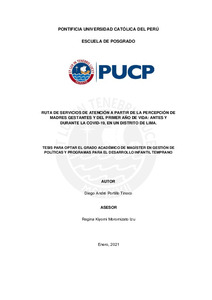| dc.contributor.advisor | Moromizato Izú, Regina Kiyomi | |
| dc.contributor.author | Portillo Tinoco, Diego André | |
| dc.date.accessioned | 2021-07-20T02:24:15Z | |
| dc.date.available | 2021-07-20T02:24:15Z | |
| dc.date.created | 2021 | |
| dc.date.issued | 2021-07-19 | |
| dc.identifier.uri | http://hdl.handle.net/20.500.12404/19739 | |
| dc.description.abstract | Objetivo. Se busca identificar las percepciones acerca de las limitaciones y
fortalezas sobre la ruta de servicios de atención dirigidos a las gestantes en el último
trimestre y madres con hijos(as) hasta el primer año de vida, antes y durante la
COVID-19, en Carabayllo. Metodología. Se usó una metodología cualitativa, se
recopiló información a través de entrevistas a profundidad por llamada telefónica a
20 participantes: 4 gestantes en el último trimestre y 16 madres con hijos de 0 a 12
meses, quienes participaron por consentimiento informado. Se realizó un análisis
temático de tipo inductivo. Se dialogó sobre las experiencias de atención y se
reconstruyó, desde su percepción, la ruta de servicios de atención, en comparación
a una ruta establecida en el país. Resultados/conclusiones. Se visualiza que la
ruta experimentada por las participantes se concentra en el sector público de salud,
y aun así se presentan “fugas” o “atajos” cuando estos servicios no pueden cubrir
o asegurar la atención completa. Se visualiza que las madres perciben diversas
fortalezas y limitaciones de los servicios de atención de salud, valorando 4 aspectos
relevantes para la calidad de atención: i) Orientación e información; ii) Trato cálido;
iii) Organización de la atención y tiempos de atención; y iv) Servicios y
equipamientos. Si bien la ruta debería integrar otros servicios ofrecidos por diversas
instituciones, las madres señalan solo tener referencia de las oficinas de RENIEC
adheridas a los centros de salud de parto, por el valor que supone el DNI para el
acceso a los servicios de salud. Se encuentra que hay menos conocimiento de los
servicios de CUNA MÁS e instituciones escolarizadas y no escolarizadas; y se
observan pérdidas de atención acontecidos por la pandemia de la COVID-19. | es_ES |
| dc.description.abstract | Objective. This study aims to identify perceptions about the limitations and
strengths of the route of delivery of care services for pregnant women during the
last trimester and mothers with children up to their first year of life, before and during
the COVID-19 pandemic, in Carabayllo. Methodology. A qualitative methodology
was used, information was collected through in-depth interviews by telephone call
to 20 participants: 4 pregnant women in the last trimester and 16 mothers with
children from 0 to 12 months, who participated by informed consent. An inductive
thematic analysis was carried out. Participants discussed their experiences during
care and reconstructed, from their perspective, the care delivery route during the
COVID-19 pandemic, compared to an established route in the country. Results /
conclusions. It is seen that the route experienced by participants is concentrated
in the public health sector. Even so, there are “leaks” or “shortcuts” when these
services cannot cover or ensure complete and comprehensive care. It was found
that mothers perceived various strengths and limitations regarding health care
services, evaluating 4 relevant aspects for the quality of care: i) Orientation and
information; ii) Warm treatment; iii) Organization of care and times of care; and iv)
Services and equipment. Although the care delivery route should integrate other
services offered by various institutions, the mothers indicated that they only have a
reference from the RENIEC offices attached to the delivery health centers, due to
the value of the DNI for accessing health services. It was found that there was less
knowledge of CUNA MÁS services and educational and non-educational
institutions; and service losses were observed due to the COVID-19 pandemic. | es_ES |
| dc.language.iso | spa | es_ES |
| dc.publisher | Pontificia Universidad Católica del Perú | es_ES |
| dc.rights | info:eu-repo/semantics/openAccess | es_ES |
| dc.rights.uri | http://creativecommons.org/licenses/by/2.5/pe/ | * |
| dc.subject | COVID-19 (Enfermedad) | es_ES |
| dc.subject | Madres gestantes--Perú--Lima | es_ES |
| dc.subject | Desarrollo infantil--Política gubernamental--Perú--Lima | es_ES |
| dc.subject | Salud pública--Política gubernamental--Perú--Lima | es_ES |
| dc.title | Ruta de servicios de atención a partir de la percepción de madres gestantes y del primer año de vida: antes y durante la COVID-19, en un distrito de Lima | es_ES |
| dc.type | info:eu-repo/semantics/masterThesis | es_ES |
| thesis.degree.name | Maestro en Gestión de Políticas y Programas para el Desarrollo Infantil Temprano | es_ES |
| thesis.degree.level | Maestría | es_ES |
| thesis.degree.grantor | Pontificia Universidad Católica del Perú. Escuela de Posgrado | es_ES |
| thesis.degree.discipline | Gestión de Políticas y Programas para el Desarrollo Infantil Temprano | es_ES |
| renati.advisor.dni | 10541191 | |
| renati.advisor.orcid | https://orcid.org/0000-0002-0588-2802 | es_ES |
| renati.author.dni | 76211628 | |
| renati.discipline | 314457 | es_ES |
| renati.juror | González Simón, Patricia Elena | |
| renati.juror | Moromizato Izu, Regina Kiyomi | |
| renati.juror | Llanos Zavalaga, Luis Fernando | |
| renati.level | https://purl.org/pe-repo/renati/level#maestro | es_ES |
| renati.type | http://purl.org/pe-repo/renati/type#tesis | es_ES |
| dc.publisher.country | PE | es_ES |
| dc.subject.ocde | http://purl.org/pe-repo/ocde/ford#5.06.02 | es_ES |






